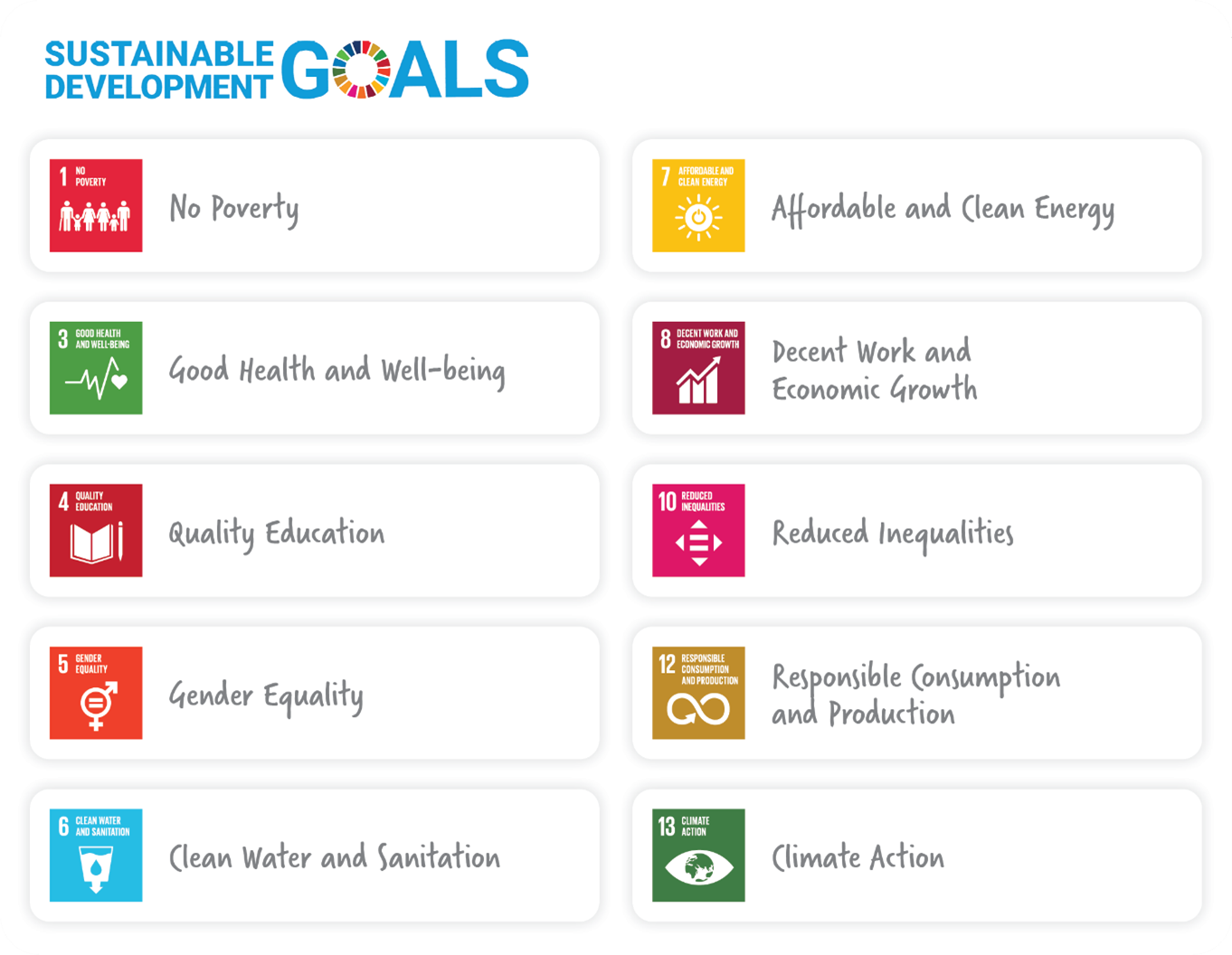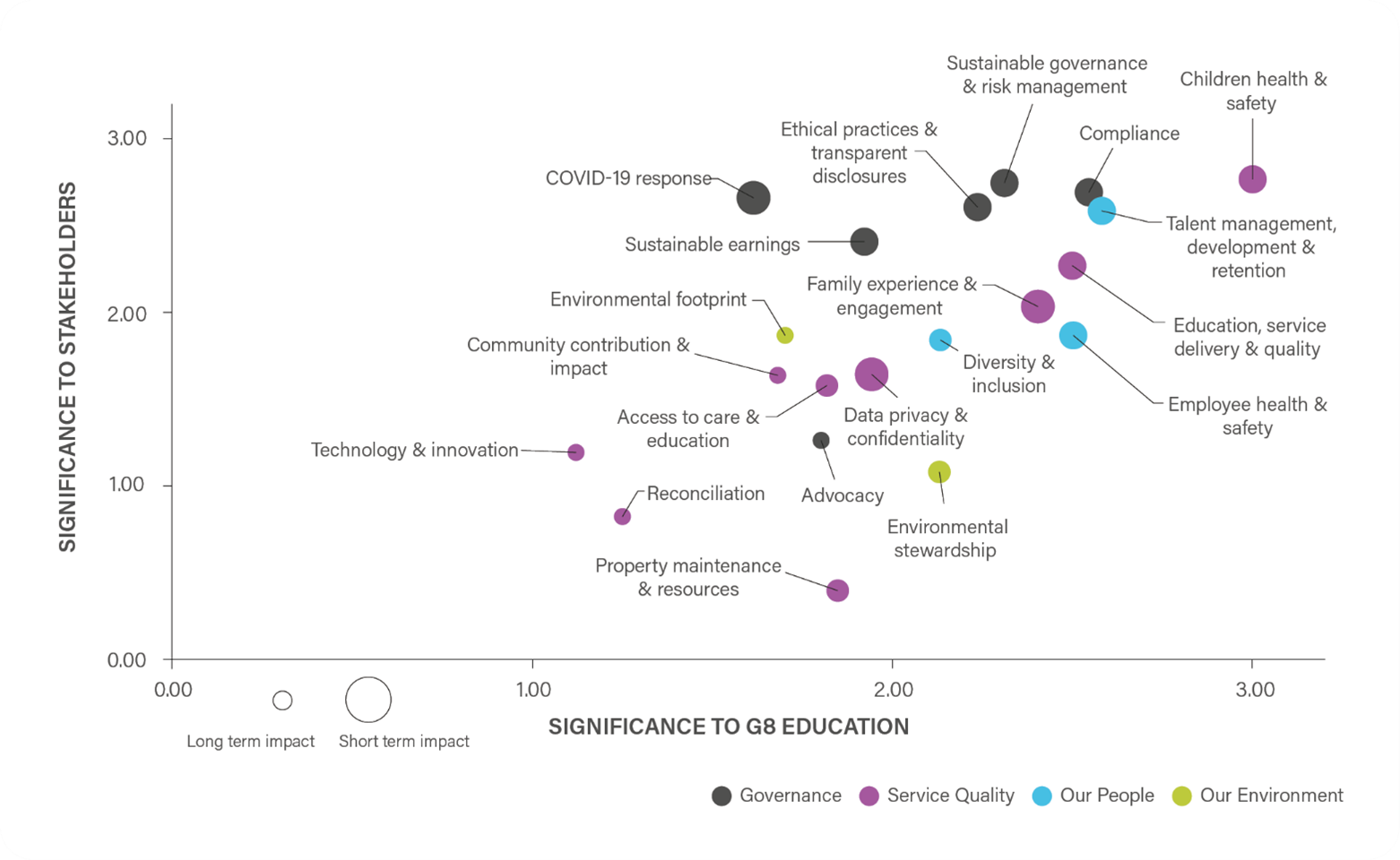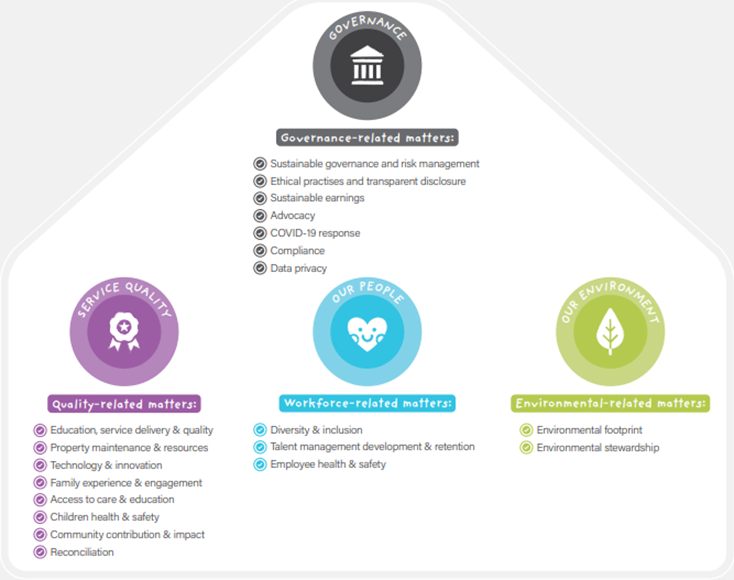Sustainability at G8 Education
At G8 Education we believe in the power of the individual to do good – in the workplace, at home and within the communities in which we operate. Helping others is fundamental to our culture and we aim to instil this in our families and our team members.
Our business exists to deliver on our purpose, creating the foundations for learning for life.
We have a proud history of supporting various initiatives, charities and appeals. We’ve learned that the joy of giving is far greater than receiving, and collectively more than 450,000 children and 10,000 passionate and caring team members across our national network can make a real difference.
We aim to put the needs of families, communities and the planet at the heart of our centres today to build a better tomorrow.
We recognise the important role we play in the lives of the children in our care, the families we support and the community in which we operate. We aim to contribute to a robust, equitable and sustainable future for all stakeholders.
Sustainability Approach

2023 marked a pivotal year in the landscape of sustainability reporting as the International Sustainability Standards Board (ISSB) released its inaugural global sustainability standards under the IFRS framework, and the Australian Accounting Standards Board (AASB) released its exposure draft ED SR1 Australian Sustainability Reporting Standards – Disclosure of Climate-related Financial Information. We appreciate this positive step towards standardising reporting and recognise the importance of aligning our efforts with these standards ahead our first year of mandatory reporting in 2025.
As we continue our pathway towards mandatory reporting, we have adopted a continuous improvement approach to sustainability, where sustainability performance and reporting transparency increases each year in an effort to align with the United Nations Sustainable Development Goals (SDGs). The 17 SDGs set a global agenda for sustainable development through 2030 and are a call to action to address the world’s most pressing economic, environmental and social issues. We are committed to progressing the United Nations Sustainable Development Goals (SDGs) and we have mapped our priority goals to our Sustainability Pillars. Our aim is to make transparent disclosures and to openly communicate our targets and progress where meaningful and feasible to do so.
Materiality assessment

In 2020, we began the process of revising our sustainability strategy by engaging Ernst and Young as an independent consultant to conduct a materiality assessment designed to identify and understand the most material areas of focus for long-term value creation for our stakeholders. This materiality assessment has shaped our strategic sustainability initiatives and commitments moving forward.
The material topics identified in the materiality assessment were grouped against four sustainability pillars. The below matrix maps the importance of these material topics to stakeholders against their business impact. Large dots represent short-term priorities whereas smaller dots, while still important, form part of G8 Education’s long term sustainability goals.
By identifying and prioritising the topics most significant to us and applying those learnings to our risk management framework, we can proactively manage material economic, social and environmental risks identified by our stakeholders and make more informed decisions that better reflect their needs and expectations of our business.
As we continue our journey towards responsible and ethical business practices, we intend to refresh our materiality assessment in 2024. This forthcoming evaluation aims to provide us with updated insights into the evolving concerns and expectations of our stakeholders, allowing us to refine our sustainability strategy and ensure that we address the most relevant issues in our pursuit of a more sustainable future.
Sustainability Pillars

See our progress across each sustainability pillar…
Read on below to learn more about G8 Education’s ongoing efforts across each of our sustainability pillars.
Governance
Governance is the overarching pillar, representing half of our top material topics also reflecting how critical strong governance is to our success. Stakeholders have increasingly high expectations in relation to financial performance, governance issues and risk management, as well as ethical practices, and want to ensure that management is kept accountable for improving sustainability performance through transparent disclosures. We must demonstrate ethical practices and decision-making throughout all levels of our organisation in order to succeed.
Read more below on our progress and our goals in governance.
Through the oversight of the Board, G8 Education believes that good corporate governance and sound risk management practices are integral to our operational and strategic objectives. We comply with the ASX Corporate Governance Council’s Corporate Governance Principles and Recommendations (4th Edition) and are committed to continuous improvement of our governance and risk management practices. For more detailed information about our Corporate Governance, please refer to our latest corporate governance statement, available here.
Our progress:
- Continuous improvement of Enterprise Risk Management, including through regular risk workshops and Board reporting
- Compliance with ASX Corporate Governance Council’s Corporate Governance Principles and Recommendations (4th Edition)
- Mandatory compliance training on child safety and information security
- Regular incident and compliance reporting to the Board
- Whistleblower and privacy training
- Application of capital allocation framework directing free cash flow based on return hurdles, prioritising investment growth, returning excess capital and/or reducing debt
- Improved advocacy for the sector, including by voluntarily joining multi-employer bargaining process to advocate for improved working conditions in the sector
- Implementation of new supplier portal and procure to pay system to improve transparency and control over supply chain
- Increased focus on privacy and cyber security which remains a high-risk area
Our goals:
- Alignment with global sustainability standards under the IFRS framework in anticipation of mandatory reporting in Australia
- Continued investment in Improvement Programs with transparent reporting to stakeholders demonstrating the associated benefits
- Leading advocate for children and the early learning sector
Service quality
Child health and safety is a key focus as well as curriculum delivery and family experience and engagement. Service Quality is G8 Education’s core business and is directly linked to our families’ satisfaction with our services and centre occupancy driving financial returns.
We are dedicated to offering high-quality and inclusive early childhood education and care for children and families. Our play-based, child-led pedagogy aligns with the National Quality Framework (NQF) principles. These guiding principles include respecting and positioning the rights of every child as paramount to everything we do as an organisation, viewing all children as competent and capable learners, a continued commitment to equity and inclusion, valuing Australia’s Aboriginal and Torres Strait cultures, recognising families as children’s first teachers, and ensuring centres are embedding quality every day.
Read more below on our progress and our goals in our service quality.
Our progress:
- 92% of centres assessed in 2023 are “meeting” or “exceeding” NQS Quality Area 1 – Educational program and practice. 910% of centres in the network n nextwork are “meeting or exceeding” the NQF, against a national average of 89%
- Extensive training on Child Protection and Mandatory Reporting to promote a strong child protection culture
- Compliance with the NQS is a non-financial key performance indicator that impacts remuneration under the group’s short term incentive plans
- Investment in quality improvement programs with a focus on building the capability of educators and teachers to enhance pedagogy and practice, including the evidence based RAMSR Program (Rhythm and Movement for Self-Regulation) developed by the Queensland University of Technology and Digital Literacies@Play
- Appointment of Educational Advisory Committee to provide thought leadership to the organisation in supporting the Education Strategy
- Enterprise Reflect ReconcilationReconciliation Action Plan endorsed and published by Reconciliation Australia in December 2023
- Appointment of inhouse Family Support Team and “Always on” Net Promoter Score
- Engaging with families and communities through various community support initiatives including: gift packs and other initiatives for teams and families that have been through challenging times, Cleaning up Australia, gathering pyjamas for Pyjama day, nappy collections, blood donations, raising money for local charities
Our goals:
- 95% of network achieving ‘Meeting’ or ‘Exceeding’ under the NQS by end of 2024
- Implement Internal Quality Measure to bring timely views on quality and enabling targeted support
- Embed xpand “Always on” Net Promoter Score keeping a real time pulse on our family satisfaction and providing targeted support in response to any issues
- Complete at least 80% of Deliverables in Reflect Reconciliation Action Plan by 2024
Our People
Our People and the culture of our teams are what create and maintain our reputation. As a people-focused business, employee health and safety, talent management, development and retention drive the success of G8 Education. It is critical that we retain and invest in values-driven team members who are committed to the best interest of children under our care.
Team member recruitment and retention remains one of the biggest challenges for G8 Education and improving our employee value proposition and offer is one of our key strategic priorities. We will continue to invest in our people and are finding new ways to advocate for and recognise the value and significant work of those working in the frontline of our sector.
Read more below on our progress and our goals in our people and teams.
Our progress:
- Over 1,500 team members currently enrolled in G8 Study Pathways Program
- Strong gender diversity on the Board (57% female Non-Executive Directors) and Executive Leadership Team (57%) at 31 December 2023
- Improved employee engagement score in FY24, stable at 76% against a sector average of 71%
- Our team members raised over $200k in 42K Your Way for the Children’s Hospital Foundation in FY23
- Sponsor of the National Early Childhood Australia Conference
- Annual ECT roadshow for our teachers, connecting them to upcoming curriculum changes and providing time to network, share information and meet colleagues
- In FY23, more than 18% of our team have flexible working arrangements to support wellbeing and life balance for team
- Finalist in various large employer of the year awards
- Improved yearly retention
- Reduction in gender pay gap
- Reduction in use of agency staff
Our goals:
- Continue to development of dynamic workforce
- Further develop employee value proposition
- Advocate for improved working conditions and government funding through multi-employer bargaining process
- Further promote diversity and inclusion amongst team members and within centres
- Increase team member engagement score
- Become an employer of choice in Early Childhood Education
Our environment
Climate change is one of the defining issues of our time, and escalating natural disasters have highlighted the ongoing risk and importance of responding to climate change in Australia and around the world. We play an important role in educating our children on the impacts of climate change and the importance of reducing our environmental footprint.
G8 Education supports the goal of the Paris Agreement to limit global warming to well below 2 degrees Celsius compared to pre-industrial levels, and has set reduction in scope 1 and scope 2 emissions targets with a 1.5 degrees scenario. G8 Education also supports the goals of the Task force for Climate-related Financial Disclosures (TCFD).
Read more below on G8 Education’s efforts to make a positive impact on our environment.
Climate Governance
G8 Education’s Board is ultimately responsible for overseeing climate-related risks and opportunities. The Board has delegated oversight to the Audit & Risk Management Committee within our Enterprise Risk Management Framework.
It is the responsibility of G8 Education’s Senior Leadership team to assess and manage climate-related risks and opportunities. A working group has been established to report to the Audit & Risk Management Committee on the progress the Company is making against its sustainability targets and initiatives, including those that are climate‑related.
Climate Strategy and Risk Management
The group has identified that the following climate related risks may impact its operations:
- physical risks as a result of extreme weather events such as flooding or bush fires that cause disruptions to centre operations, damage to or destruction of centres and increased energy usage to mitigate extreme temperature fluctuations
- transition risks associated with increased expenditures from more expensive grid energy and compliance, and negative reputational and/or financial impacts from not reducing emissions.
We also identified and have made progress on key opportunities, including through the implementation of a network wide solar program which is expected to reduce both our emissions and energy costs over time.
Climate Metrics and Targets
G8 Education’s scope 1 and 2 emissions are predominantly made of fleet emissions and grid energy (electricity and gas) consumption requirements. Additionally, some sites have bottled LPG to meet their energy consumption requirements, and some sites have solar panels installed to reduce reliance on the grid. In addition to the implementation of our solar program, we are also focussing on our fleet emissions through progressively switching fleet vehicles from petrol to hybrid.
In line with our support of the Paris Agreement, our targets to reduce our scope 1 and 2 emissions align with a 1.5-degree Celsius scenario. This requires us to achieve a 4.2% reduction in our emissions year-on-year over the next five years, from our 2021 base line. Holding global warming to 1.5 degrees above pre-industrial levels could limit the most dangerous and irreversible effects of climate change, and we have a number of initiatives underway to meet this target.
The methodology utilised to estimate energy and gas emissions aligns with the guidelines outlined in the Greenhouse Gas Protocol (GHG Protocol). The process involves utilizing state-based National Greenhouse and Energy Reporting (NGER) Emission Factors, which are updated and published annually, for both electricity and gas. Consumption data for each site is segmented into the first and second halves of the relevant reporting year, allowing for the application of the corresponding NGER factors. In cases where site periods span the beginning or end of the reporting year, consumption figures are prorated to ensure accuracy within the designated timeframe. Additionally, for sites with periods overlapping the middle of the year, consumption is similarly prorated into each half of the year. Finally, emission factors are applied at the state level for each half of the year, resulting in the calculation of total emissions.
We currently have limited visibility on its scope 3 emissions. We are developing our capacity in this regard with an intention to commence reporting on scope 3 emissions from 2025.
